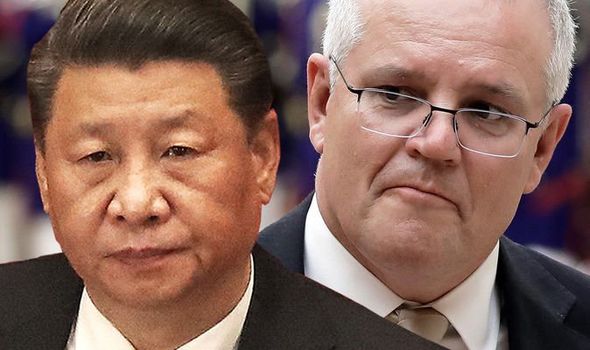Amidst the ongoing Australia-China rivalry, the Morrison government is all set to mount another assault on China by setting its foot in the arena of ‘sanction diplomacy’. As per Reuters, Australia is soon going to introduce a sanctions law similar to the US Magnitsky Act, to sanction the perpetrators of “egregious acts of international concern.” The move is believed to be aimed at Australia’s top rival China which has imposed hard-hitting sanctions on the Australian economy following Canberra’s calls for an open enquiry into the Covid origins.
Foreign Minister Marise Payne said on Thursday the government intended to introduce the reforms to target “sanctionable conduct wherever it occurs” before the end of the year. The “sanctionable conduct” could include Human rights abuses, malicious cyber activity, proliferation of nuclear weapons or serious corruption in the government.
Read More: Influence political, social, business and media circles; China’s wicked plan to take over Australia
“Australia will have the ability to impose targeted financial sanctions and travel bans against individuals and entities determined to be involved in such sanctionable conduct wherever it occurs, without having to establish specific country-based regimes,” Marise Payne said.
China is known for its gross human rights violation in Hong Kong and the western region of Xinjiang. Also, China has emerged as the biggest threat in the Cyber Security realm with thousands of cyberattacks being carried out by Chinese hackers every day. Moreover, China is also sporadically accused of proliferation of nuclear technology to North Korea and some West Asian nations. Hence, the law is astutely designed to target Chinese illicit actions without even mentioning the name of China.
Australian sanction regime so far has remained grounded on the United Nations-led multilateral efforts, along with autonomous punitive measures based on country-specific designations, including North Korea, Libya, Syria, Iran and Myanmar.
Currently, the Australian government does not hold any authority to sanction any foreign entity or the government under its constitution. Thus, the new law is expected to bring Australia at par with other western democracies that recently imposed sanctions on the Chinese regime for brazen infringement of basic human rights.
In March, the United States, the European Union and Britain sanctioned Chinese officials in connection with serious human rights abuses in China’s Xinjiang region, prompting retaliatory action from Beijing.
This was a carefully orchestrated move by all the US friendly countries. However, what Australia could come up with was just an endorsement of the aforesaid move. Now, the new law is expected to bridge the gap between Australia and the other western democracies.
Australia and China have locked horns with each other since the outbreak of Covid-19 last year. Australia was the very first nation to call for a WHO-led investigation into Covid origins, prompting Beijing to retaliate heavy-handedly. China expected Australia to budge before its hegemonic attitude; however, a trade war with Australia has proven to be a costly affair for the Chinese government. Moreover, the trade war with China also provided Australia with an opportunity to diversify its supply chain and subdue its over-dependence on the Chinese economy.
Read More: Australia has defeated China in the telecom wars in Pacific islands
Outspoken Chinese critics and hawks James Paterson and Kimberley Kitching are believed to be architects of Australia’s new Sanction strategy. The duo serves as co-chairs of the Inter-Parliamentary Alliance on China and is among the key advocates of the Magnitsky-style reforms. Despite much pomp and glory, Chinese sanctions have so far proven to be far less than enough to make the Scott Morison administration kneel before a hostile China and thus, now an emboldened Australia is seemingly upping the ante in the ongoing fierce battle against the Chinese Communist Party.








